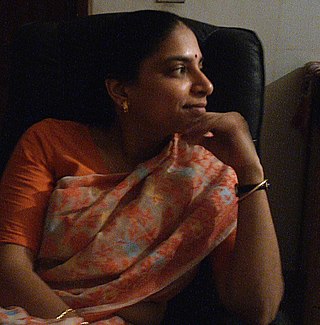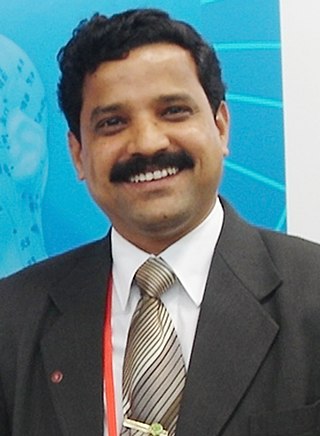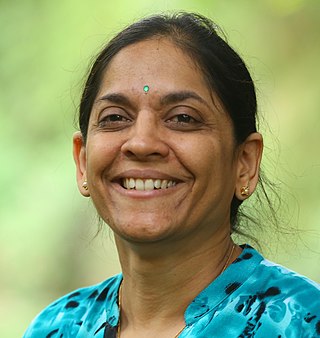
Michael Lawrence KleinNAS is Laura H. Carnell Professor of Science and director of the Institute for Computational Molecular Science in the college of science and technology at Temple University in Philadelphia, US. He was previously the Hepburn Professor of Physical Science in the Center for Molecular Modeling at the University of Pennsylvania.

Vinod K. Singh is a Rahula and Namita Gautam Chair Professor of Chemistry at IIT Kanpur. He is also the Director's Chair Professor at IISER Bhopal & adjunct professor at NIPER Hyderabad. He is currently the President, Chemical Research Society of India and the Chairman, Governing Council of IACS Kolkata.

Garikapati Narahari Sastry is an Indian Chemist and a Professor at the Department of Biotechnology at IIT-Hyderabad. He served as Director of CSIR- North East Institute of Science and Technology, Jorhat Jorhat, Assam from 19 February 2019 and served there till 10 January 2024. After taking charge as the Director, he has worked towards converting knowledge in the areas of computational modelling and Artificial intelligence from basic to translational research, by working closely with society and industry. Ultimately, revitalizing the strength of science and technology is essential in achieving the self-reliant and strong India. In the era of Industry 4.0 and 5.0, combining our traditional wisdom with modern science appear to be indispensable in the sectors such as Education, Health, Agriculture, Industrial and Societal development at large. Prior to joining as the Director, he headed the Molecular Modelling Division at the CSIR Indian Institute of Chemical Technology in Hyderabad, India. Sastry has made pioneering contributions in the areas of computational chemistry and computational biology.

Eluvathingal Devassy Jemmis is a professor of theoretical chemistry at the Indian Institute of Science, Bangalore, India. He was the founding director of Indian Institute of Science Education and Research, Thiruvananthapuram (IISER-TVM). His primary area of research is applied theoretical chemistry with emphasis on structure, bonding and reactivity, across the periodic table of the elements. Apart from many of his contributions to applied theoretical chemistry, an equivalent of the structural chemistry of carbon, as exemplified by the Huckel 4n+2 Rule, benzenoid aromatics and graphite, and tetrahedral carbon and diamond, is brought in the structural chemistry of boron by the Jemmis mno rules which relates polyhedral and macropolyhedral boranes to allotropes of boron and boron-rich solids. He has been awarded Padma Shri in Science and Engineering category by the Government of India.

Malur R. Narasimha Prasad or M.R.N. Prasad was an Indian Endocrinologist and Professor, known for his research in the field of reproductive physiology and the regulation of fertility. His major contributions were in the areas of comparative endocrinology, the regulation of male fertility, and the use of non-human primates in biomedical research.
V Ramgopal Rao is an Indian Academic serving as the Vice Chancellor of Birla Institute of Technology and Science, Pilani from February 2023 onwards. He was previously the director of IIT, Delhi for six years during 2016-2021.

Charusita Chakravarty was an Indian academic and scientist. She was a professor of chemistry at the Indian Institute of Technology, Delhi since 1999. In 2009 she was conferred Shanti Swarup Bhatnagar Prize for Science and Technology in the field of chemical science. In 1999, she received B.M. Birla Science Award. She was an Associate Member of the Centre for Computational Material Science, Jawaharlal Nehru Centre for Advanced Scientific Research, Bangalore.
Usha Vijayraghavan is an Indian molecular biologist. She is on the faculty of the Department of Microbiology and Cell Biology, at the Indian Institute of Science. Her major research interests are Molecular Genetics, Plant Development.
Goverdhan Mehta is an Indian researcher and scientist. From 1998-2005 he was the director of the Indian Institute of Science (IISc). Previously from 1977-1998, Mehta was a professor of chemistry and vice-chancellor at the University of Hyderabad. Mehta has authored over 550 research papers.
Dipankar Das Sarma, popularly known as D.D. Sarma, is an Indian scientist and structural chemist, known for his researches in the fields of Solid State Chemistry, Spectroscopy, Condensed Matter Physics, Materials Science, and Nanoscience. He is a former MLS Chair Professor of Physics and Chairman of the Centre for Advanced Materials and the GAST Professor of Uppsala University, Sweden, A recipient of TWAS Physics Prize and the UNESCO Biennial Javed Husain Prize, Sarma was honored by the Council for Scientific and Industrial Research (CSIR), Government of India, in 1994, with the Shanti Swarup Bhatnagar Prize for Science and Technology.
Thiruvengadam Rajendram Seshadri FNA, FRS was an Indian chemist, academic, writer and the Head of the Department of Chemistry at the University of Delhi, known for his researches on the Indian medicinal and other plants. He was a Fellow of the Royal Society, UK and an elected member of the German Academy of Sciences Leopoldina. Besides several articles, he also published two books, Chemistry of Vitamins and Hormones and Advancement of Scientific and Religious Culture in India. The Government of India awarded him the third highest civilian honour of the Padma Bhushan, in 1963, for his contributions to Science.
Sandhya Srikant Visweswariah is a scientist and academic at the Indian Institute of Science, Bangalore, India. She was the Chairperson of the Department of Developmental Biology and Genetics and the Co-chair of the Department of Bioengineering, Indian Institute of Science. She additionally holds the position of Adjunct Professor, Faculty of Medicine and Dentistry, University of Bergen, Norway. Her research involves the investigation of the mechanism of signal transduction via cyclic nucleotides, phosphodiesterases and novel cyclases in bacteria. Most recently, she was awarded a Bill and Melinda Gates Grand Challenges Explorations Grant for her proposal entitled "A Small Animal Model of ETEC-Mediated Diarrhea".
Govindasamy Mugesh is an Indian inorganic and physical chemist, a professor and the head of the Mugesh Laboratory attached to the department of Inorganic and Physical Chemistry at the Indian Institute of Science. He is known for his studies on the mechanism of thyroid hormone action and is an elected fellow of the Indian Academy of Sciences, Indian National Science Academy, Royal Society of Chemistry and the National Academy of Sciences, India. The Council of Scientific and Industrial Research, the apex agency of the Government of India for scientific research, awarded him the Shanti Swarup Bhatnagar Prize for Science and Technology, one of the highest Indian science awards, in 2012, for his contributions to chemical sciences. In 2019, he was awarded the Infosys Prize in Physical Sciences for his seminal work in the chemical synthesis of small molecules and nanomaterials for biomedical applications.

Pulok Kumar Mukherjee is an Indian scientist working as the Director of Institute of Bioresources and Sustainable Development, an autonomous Institute under Department of Biotechnology, Govt. of India, Imphal, Manipur, India; as well as an Associate Editor of the Phytomedicine Plus; Consulting Editor of the Pharmacological Research published by Elsevier. He is the Professor of Pharmaceutical technology at the Jadavpur University and former Director of the School of Natural Product Studies, Jadavpur University, Kolkata, India.
Rajendra Prasad Roy is an Indian chemical biologist, biochemist and a scientist at the National Institute of Immunology. Known for his studies in protein engineering, Roy has developed several chemo-enzymatic strategic processes for which he has a patent assigned to him. He holds a PhD from the Indian Institute of Science and is an elected fellow of all the three major Indian science academies namely Indian National Science Academy, Indian Academy of Sciences, and National Academy of Sciences, India. The Department of Biotechnology of the Government of India awarded him the National Bioscience Award for Career Development, one of the highest Indian science awards, for him contributions to biosciences in 2005. Currently he is the dean of Regional Centre for Biotechnology, Faridabad.
Sudip Chattopadhyay is an Indian developmental biologist, biotechnologist and the dean of research and consultancy at the National Institute of Technology, Durgapur. Known for his studies on the molecular basis of light-controlled plant growth and development, Chattopadhyay is a J. C. Bose National Fellow of the Science and Engineering Research Board (SERB) and an elected fellow of all the three major Indian science academies namely Indian National Science Academy, Indian Academy of Sciences and National Academy of Sciences, India. The Department of Biotechnology of the Government of India awarded him the National Bioscience Award for Career Development, one of the highest Indian science awards, for his contributions to biosciences in 2005.
Dulal Panda is an Indian cell biologist and the chair professor at the department of biosciences and bioengineering of the Indian Institute of Technology, Bombay. Presently, he is the Director of NIPER, SAS Nagar (Mohali). Known for his studies on microtubule dynamics and FtsZ assembly dynamics, Panda is an elected fellow of the Indian Academy of Sciences and the National Academy of Sciences, India. The Department of Biotechnology of the Government of India awarded him the National Bioscience Award for Career Development, one of the highest Indian science awards, for his contributions to biosciences in 2005.
Ramanathan Sowdhamini is an Indian computational biologist, bioinformatician. He is a professor at the department of biochemistry, biophysics and bioinformatics of the National Centre for Biological Sciences, a TIFR research facility located in Bengaluru. Known for computational studies in the field of Protein Science, Sowdhamini is also associated with the Institute for Stem Cell Biology and Regenerative Medicine as a collaborator and is an elected fellow of the Indian Academy of Sciences as well as the Indian National Science Academy. The Department of Biotechnology of the Government of India awarded her the National Bioscience Award for Career Development, one of the highest Indian science awards, for her contributions to biosciences in 2007.

Professor Maneesha Inamdar is a stem cell and developmental biologist conducting research at Bangalore, India. She is presently Director of inStem, India’s first stem cell institute. She is on deputation from the Jawaharlal Nehru Centre for Advanced Scientific Research (JNCASR), Bangalore. She is an elected fellow of the Indian Academy of Sciences and the Indian National Science Academy and a J C Bose National Fellow.
Seema Bhatnagar is an Indian scientist, working in the field of anticancer drug discovery. She primarily works on synthetic chemistry approaches for targeted delivery of anticancer drugs in breast cancer.







